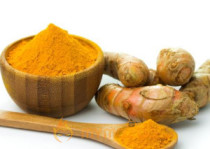Peppery, warm and bitter flavor Turmeric comes from the root of the Curcuma longa plant and has a tough brown skin and a deep orange flesh. It is long been used as a powerful anti-inflammatory in both the Chinese and Indian systems of medicine. It helps in a wide variety of conditions, including flatulence, jaundice, menstrual difficulties, bloody urine, hemorrhage, toothache, bruises, chest pain, and colic.
Journal of the American Chemical Society mentions that turmeric contains a wide range of antioxidant, antiviral, antibacterial, antifungal, anticarcinogenic, antimutagenic and anti-inflammatory properties. Curcuma longa, also known as turmeric, is effective in the treatment of various types of cancer, including breast and ovarian cancer, which has risen 30 percent among women in the last one decade, says a study conducted by B.L. Kapoor Memorial Hospital.Turmeric has nearly 20 molecules with antibiotic property, 14 molecules with cancer preventive potential, 12 with anti-tumour effect, says the study.
"At least 12 molecules in it have anti-cancer effect while 10 of them have anti-oxidant features. Overall, turmeric is known for it's antibiotic, antiseptic, anti-cancer and anti-oxidant property. It is known to be a good digestive substance," said the study.According to the study, turmeric contains curcuminoids which are the main component found to be effective in cancer treatment. "Curcumin, the principal curcuminoid of turmeric, has been intensely studied as a cancer protective agent. Its potential has been tapped in head and neck cancers, breast, lung, gastro-intestinal cancer, ovarian cancer, melanoma, neurological cancers, sarcoma, leukemias and lymphoma," said the study.
Inputs from iansTapaswini Sharma, Senior Consultant (Surgical Oncology) at B.L. Kapoor Memorial Hospital, said: "Curcumin suppresses all three stages of carcinogenesis: initiation, promotion and progression. It also has a role in neutralising substances and conditions which lead to cancer.""By inhibiting the enzyme Topoisomerases, which is required for multiplication of cancer cells, it is able to arrest the growth of these cells," said Sharma. With time, cancers cells tend to become resistant to chemotherapy and radiotherapy, Sharma observed.Curcumin, on the other hand, when consumed in therapeutic doses, targets several cancer pathways and sensitizes the cancer cells to chemotherapy drugs by increasing the pace of death of the cancer cells, she said.
"Studies in advanced breast cancer have also shown that curcumin increases the effect of chemotherapy and prevents the spread of cancer cells to the lung," she said. "In lung carcinoma, when curcumin is added to the chemotherapeutic drug, it increases the effectiveness of the drug by promoting cell death of cancer cells. The efficacy of it has also been seen in the brain tumours where it sensitises the tumour cells to the cancer drugs," said Sharma.The study shows curcumin enhanced the effect of radiotherapy by inhibiting tumour regrowth per se, and also by suppressing new vessel formation. Being a powerful anti-oxidant it scavenges all the harmful free radicals induced by radiation exposure of the cells, thereby reducing the side effects of radiotherapy.
According to Delhi based Nutritionist Anshul Jaibharat , "To be brief turmeric can termed as an indian wonder spice. It's anti-inflammatory and hence helps in people suffering from arthritis. It works as an antiseptic and is warm in nature so it's good for people having cold and coughs during changes in weather. The raw form when grinded has the best nutritional value even more than the processed and packaged one. The compound curcumin in turmeric has shown numerous benefits to human body as per both Ayurveda and Modern science."











